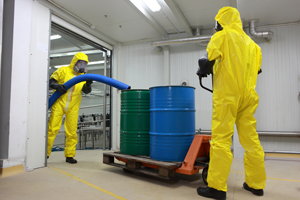|
Solid & Hazardous Waste Management
|
 The management of solid and hazardous waste receives is heavily
scrutinized and society is tasked with solving the very difficult
problems raised by comprehensive waste management. The increase in
volume of waste by-products results in the emergence of new
technologies to properly recycle usable materials and to safely
and permanently dispose of unusable residues. RTP is in the
forefront of waste management from environmental and regulatory
perspectives. The management of solid and hazardous waste receives is heavily
scrutinized and society is tasked with solving the very difficult
problems raised by comprehensive waste management. The increase in
volume of waste by-products results in the emergence of new
technologies to properly recycle usable materials and to safely
and permanently dispose of unusable residues. RTP is in the
forefront of waste management from environmental and regulatory
perspectives.
A large portion of our efforts is currently directed at the solid
waste management area. This includes:
-
Providing environmental consulting and permitting services for
construction and operation of waste disposal facilities such as
landfill, composting facilities, resource recovery projects,
composting and recycling efforts.
-
Responding to NSPS and Emission Guideline requirements for
landfills, municipal solid waste combustors, and other solid
waste disposal facilities as applicable.
-
Providing technical and management support functions either as
complete service contracts or special task assignments.
-
We also provide the following services in hazardous waste
management:
-
Assessment of existing conditions by identifying immediate
hazards.
-
Develop necessary remediation plans.
-
Develop remedial investigation and feasibility study (RIFS) work
plans and interim reports.
-
Develop remediation alternatives leading to site closure plans.
RTP staff is acutely aware of the potential problems associated
with evaluating multimedia, multi-trajectory/multi-pathway
problems. For example, the scientific and engineering community is
just beginning to recognize the complexity of atmospheric
emissions and diffusion under various site conditions. Such issues
are normally not addressed by the standard guideline approaches
and typically are features of hazardous waste site analyses that
may result in flaws in the analysis if not properly taken into
account. The collective experience of RTP staff assures that the
problem will be evaluated completely.
Diffusion studies can be integrated into risk assessment
methodologies for determining the potential of acute and chronic
exposure. The access to risk assessment specialists and extensive
data bases provides clients with accurate and rapid responses to
their specific projects.
|